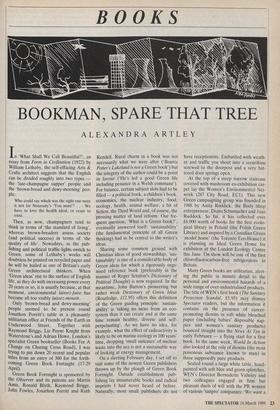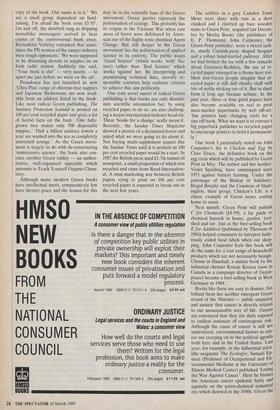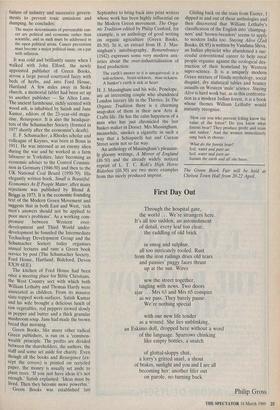BOOKS
BOOKMAN, SPARE THAT TREE
ALEXANDRA ARTLEY
In 'What Shall We Call Beautiful?', an essay from Form in Civilisation (1922) by William Lethaby, the self-effacing Arts & Crafts architect suggests that the English can be divided roughly into two types the late-champagne supper' people and the 'brown-bread and dewy-morning' peo- ple:
Who could say which was the right one were it not for Necessity's 'You must'? . . . We have to love the health ideal, or cease to exist.
Then, as now, champagners tend to think in terms of 'the standard of living', whereas brown-breaders assess society (and political success) in terms of 'the quality of life'. Nowadays, as the pub- lishing and political traffic-lights switch to Green, some of Lethaby's works will doubtless be printed on recycled paper and he will be hailed as one of Britain's early Green architectural thinkers. When `Green ideas' rise to the surface of English life, as they do with increasing power every 20 years or so, it is usually because, at that moment, environmental laissez-faire has become all too visibly laissez-mourir.
Only 'brown-bread and dewy-morning' people seemed to be present round Jonathon Porritt's table in a pleasantly utilitarian office at Friends of the Earth in Underwood Street. Together with Raymond Briggs, Liz Payne Knight from Waterstone's and Adrian Howe, London's specialist Green bookseller (Books For A Change on Charing Cross Road), I was trying to pin down 20 recent and popular titles from an entry of 300 for the forth- coming Green Book Fortnight (17-29 April).
Green Book Fortnight is sponsored by the Observer and its patrons are Martin Amis, Ronald Blyth, Raymond Briggs, John Fowles, Jonathon Porritt and Ruth Rendell. Rural charm in a book was not, necessarily what we were after (`Beatrix Potter's Lakeland is not a Green book') but the integrity of the author could be a point in favour (`He's led a good Green life including penance in a Welsh commune'). For balance, certain subject slots had to be filled — a political book, a children's book, economics, the nuclear industry, food, ecology, health, animal welfare, a bit of fiction, the Third World and, of course, the pressing matter of land reform. Our fre- quent question, 'What is a Green book?', eventually answered itself: `sustainability' (the fundamental principle of all Green thinking) had to be central to the writer's ideas.
Sharing some common ground with Christian ideas of good stewardship, 'sus- tainability' is one of a considerable body of Green ideas for which a rigorously orga- nised reference book (preferably in the manner of Roger Scruton's Dictionary of Political Thought) is now required. In the meantime, John Button's pioneering but rather weak Dictionary of Green Ideas (Routledge, £12.95) offers this definition of the Green guiding principle: 'sustain- ability' is `taking no more from an eco- system than it can create and at the same time remain healthy, diverse and self- perpetuating'. As we have no idea, for example, what the effect of radioactivity is likely to be on marine ecology in 100 years' time, dropping 'small suitcases' of nuclear waste into the sea is not a sustainable way of looking at energy management.
On a sleeting February day, I set off to visit some of the newest Green publishers thrown up by the plough of Green Book Fortnight. Outside establishment pub- lishing lay innumerable books and radical imprints I had never heard of before. Naturally, most small publishers do not have receptionists. Embattled with weath- er and traffic you shout into a securifone screwed to the doorpost and a very bat- tered door springs open.
At the top of a steep narrow staircase covered with mushroom ex-exhibition car- pet lay the Women's Environmental Net- work (287 City Road, EC1). This new Green campaigning group was founded in 1988 by Anita Roddick, the Body Shop entrepreneur, Diana Schumacher and Joan Ruddock. So far, it has collected over £6,000 worth of books for the first ecolo- gical library in Poland (the Polish Green Library) and inspired by a Canadian Green `model home' (the Toronto Eco-House) it is planning an Ideal Green Home for exhibition at the London Ecology Centre this June. On show will be one of the first chlorofluorocarbon-free refrigerators in Britain.
Many Green books are utilitarian, alert- ing the public in minute detail to the personal and environmental hazards of a wide range of over-industrialised products. The title of WEN's first book (The Sanitary Protection Scandal, £5.95) may dismay Spectator readers, but the information it contains on the presence of cancer- promoting dioxins in soft white bleached paper (including babies' disposable nap- pies and women's sanitary products) bounced straight into the News At Ten in early February — a flying start for a first book. In the same week, World In Action also looked at the role of dioxins (the most poisonous substance known to man) in these supposedly pure products.
Seated round a large white table, hand- painted with soft blue and green splotches, WEN's Director Bernadette Valleley and two colleagues engaged in firm but pleasant duels of will with the PR women of various `sanpro' companies: 'We want a copy of the book. Our name is in it.' We are a small group dependent on fund- raising. I'm afraid the book costs £5.95'. On and off, the doorbell rang as dripping motorbike messengers arrived to bear copies of the controversial book away. Bernadette Valleley remarked that some- times the PR women of the sanpro industry were tough opponents: 'We were supposed to be discussing dioxins in nappies on an Irish radio station. Suddenly she said, "Your book is shit" — very nastily — to upset me just before we went on the air'.
Peaudouce has just launched its new 'Ultra-Plus' range of chlorine-free nappies and Japanese Biobottoms are now avail- able from an address listed in the book. Like most radical Green publishing, The Sanitary Protection Scandal is printed on 100 per cent recycled paper and gives a list of horrid facts on the back. 'One fully- grown tree makes only 500 disposable nappies.' Half a billion sanitary towels a year are washed into the sea as completely untreated sewage.' As the Green move- ment is largely to do with de-constructing 'unnecessary science', the book also con- tains another Green oddity — an author- itative, well-organised appendix which amounts to Teach Yourself Organic Chem- istry.
Although many modern Green books have intellectual merit, comparatively few have literary grace and the reason for this may lie in the scientific base of the Green movement. Green parties represent the politicisation of ecology. This probably has its origins in the Vietnam War when vast areas of forest were defoliated by Amer- ican use of the highly toxic chemical Agent Orange. But still deeper in the Green movement lies the politicisation of applied science in its entirety. The public wants `Good Science' (which works 'with' Na- ture) rather than 'Bad Science' which works 'against' her. By interpreting and popularising technical data, morally re- sponsible scientists help ordinary citizens to achieve this aim politically.
One truly novel aspect of radical Green publishing is that books not only dissemi- nate scientific information but, by using recycled paper to do so, are also challeng- ing a major international industry head-on. These 'books for a change' really mean it. Recently, the Sunday Times Magazine showed a picture of a decimated forest and asked what we were going to do about it. Not buying multi-supplement papers like the Sunday Times until it is printed on 100 per cent recycled paper would be a start. In 1987 the British press used £1.7m tonnes of newsprint, a small proportion of which was recycled and came from Reed Internation- al. A mini marketing war between British papers vying to print on 100 per cent recycled paper is expected to break out in the next few years.
The cobbles in a grey Camden Town Mews were shiny with rain as a door clunked and I climbed up bare wooden stairs to Green Print, acquired last Decem- ber by Merlin Books (the publishers of E. P. Thomson). John Carpenter, the Green Print publisher, wore a tweed jack- et, sturdy Cornish-pasty shaped brogues and a robust hand-knitted pullover. After we had broken the ice with a few remarks about Greenery-Reddery, the use of re- cycled paper emerged as a theme here too. Most non-Green people imagine that re- cycled paper is still dull chunky stuff with bits of nettle sticking out of it. But in sheet form it long ago became urbane. In the past year, three or four good papers have also become available on reel to print mass-market paperbacks by web off-set, 'but printers hate changing reels for a one-off book. What we want is to convert a big paperback publisher to recycled paper to encourage printers to hold it permanent- ly.'
One book I particularly noted on John Carpenter's list is Chicken and Egg by Clare Druce, the definitive book on the egg crisis which will be published by Green Print in May. The author and her mother, Violet Spalding, have campaigned since 1973 against battery farming. Under the patronage of the Bishop of Salisbury, Brigid Brophy and the Countess of Hunt- ingdon, their group, Chicken's Lib, is a classic example of Green issues coming home to roost.
Next month, Green Print will publish C for Chemicals (£4.99), a lay guide to chemical hazards in house, garden, tool- shed and car. Just as the best-selling book E for Additives (published by Thorsons in 1984) helped consumers to interpret ludic- rously coded food labels when out shop- ping, John Carpenter feels this book will do the same for a vast range of household products which are not necessarily benign. Chemie in Haushalt, a similar book by the industrial chemist Renate Kroesa (now in Canada as a campaign director of Green- peace) became a best-selling book in West Germany in 1984. Books like these are easy to dismiss, but behind them lies another emergent Green strand of the Nineties — public suspicion and anxiety that cancer is directly related to our unsustainable way of life. Greens are convinced that they are daily exposed to endless instances of carcinogenic risk. Although the cause of cancer is still not understood, environmental factors in can- cer are creeping on to the political agenda both here and in the United States. Last year, for example, in the influential scien- tific magazine The Ecologist, Samuel Ep- stein (Professor of Occupational and En- vironmental Medicine at the University of Illinois Medical Center) published 'Losing the War Against Cancer'. Here he blames the American cancer epidemic fairly and squarely on the petro-chemical industrial era which dawned in the 1940s. Given the
failure of industry and successive govern- ments to prevent toxic emissions and dumping, he concludes:
The major determinants of preventable can- cer are political and economic rather than scientific, and as such must be addressed in the open political arena. Cancer prevention must become a major political issue, on a par with inflation.
It was cold and brilliantly sunny when I walked with John Elford, the newly appointed publisher of Green Books, across a large paved courtyard fuzzy with beds of herbs, and into Ford House, Hartland. A few miles away in Stoke church, a memorial tablet had been set up to another publisher — Sir Allen Lane. The ancient farmhouse, richly scented with wood ash, is inhabited by Satish and June Kumar, editors of the 23-year-old maga- zine, Resurgence. It is also the headquar- ters of the Schumacher Society (formed in 1977 shortly after the economist's death).
E. F. Schumacher, a Rhodes scholar and colleague of Keynes, was born in Bonn in 1911. He was interned as an enemy alien during the war and he worked as a farm labourer in Yorkshire, later becoming an economic adviser to the Control Commis- sion in Germany (1946-50) and then to the UK National Coal Board (1950-70). His elegantly written book, Small is Beautiful: Economics As If People Matter, after many rejections was published by Blond & Briggs in 1973. It is the economic founding text of the Modern Green Movement and suggests that in both East and West, 'rich men's answers should not be applied to poor men's problems'. As a working com- promise between Western over- development and Third World under- development he founded the Intermediate Technology Development Group and the Schumacher Society today organises annual lectures and runs a Green book service by post (The Schumacher Society, Ford House, Hartland, Bideford, Devon EX39 6EE).
The kitchen of Ford House had been once a meeting place for Bible Christians, the West Country sect with which both William Lethaby and Thomas Hardy were associated as children. From its massive slate-topped work-surfaces, Satish Kumar and his wife brought a delicious lunch of raw vegetables, red peppers stewed slowly in pepper and butter and a thick granular mushroom soup. June had made the brown bread that morning.
Green Books, like many other radical Green publishers, is run on a 'common- wealth' principle. The profits are divided between the shareholders, the authors, the staff and some set aside for charity. Even though all the books and Resurgence (ex- cept the covers) is printed on recycled paper, the money is usually set aside to plant trees. 'If you just have ideas it's not enough,' Satish explained. 'Ideas must be lived. Then they become more powerful.'
Green Books was established last
September to bring back into print writers whose work has been highly influential on the Modern Green movement. The Orga- nic Tradition edited by Philip Conford, for example, is an anthology of good writing on organic agriculture (Green Books, £6.50). In it, an extract from H. J. Mas- singham's autobiography, Remembrance (1942) expresses some very modern anx- ieties about the over-industrialisation of food production:
The earth's answer to it is unequivocal: it is soil-sickness, beast-sickness, man-sickness. A banker's earth is sick at heart.
H. J. Massingham and his wife, Penelope, are an interesting couple who abandoned London literary life in the Thirties. In The Organic Tradition there is a charming snap-shot of them in their new Arts & Crafts life. He has the calm happiness of a man who has just chronicled the last basket-maker in Dorset. Mrs Massingham, meanwhile, smokes a cigarette in such a way that a Schiapirelli hat and Curzon Street seem not so far way.
An anthology of Massingham's pleasant- ly gloomy writings, A Mirror of England (£6.50) and the already widely noticed reprint of L. T. C. Rolt's High Horse Riderless (£6.50) are two more examples from this nicely produced imprint. Gliding back on the train from Exeter, I dipped in and out of these anthologies and then discovered that William Lethaby's classification of the English into `champag- ners' and 'brown-breaders' seems to apply to modern India too. Staying Alive (Zed Books, £8.95) is written by Vandana Shiva, an Indian physicist who abandoned a suc- cessful conventional career to help rural people organise against the ecological des- truction of their homeland by Western super-science. It is a uniquely modern Green mixture of Hindu mythology, social disquiet, dry statistical tables and bouncy assaults on Western 'male' science. Staying Alive is hard work but, as in this confronta- tion in a modern Indian forest, it is a book whose themes William Lethaby would instantly recognise.
`How can you who prevent felling know the value of the forest? Do you know what forests bear? They produce profit and resin and timber.' And the women immediately sang back in chorus: `What do the forests bear?
Soil, water and pure air.
Soil, water and pure air Sustain the earth and all she bears.'
The Green Book Fair will be held at Chelsea Town Hall from 20-22 April.




























































 Previous page
Previous page